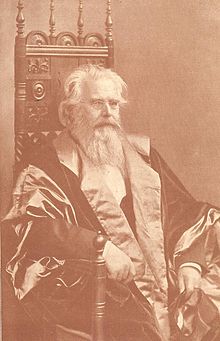Albert Becker (composer)

Albert Ernst Anton Becker (* 13. June 1834 in Quedlinburg ; † 10. January 1899 in Berlin ) was a German composer of the Romantic .
Life
Albert Becker lived in Quedlinburg at 260 Breite Strasse in his youth . From 1853 to 1856 he studied composition with Siegfried Wilhelm Dehn in Berlin, in 1854 he entered the Sing-Akademie zu Berlin .
In 1861 Becker's Symphony in G minor received second prize from 32 submitted works in a symphony competition organized by the directorate of the Gesellschaft der Musikfreunde in Vienna (first prize went to Joachim Raff's Symphony An das Vaterland ), but remained unsuccessful. Eduard Hanslick commented on this: “The composition lacks originality, creative strength and pronounced personality. A more noble direction turning away from the common, a fairly skilful use of art and an elaboration of the details that are neat to the point of fearfulness are the praiseworthy aspects of this work. ”His breakthrough to fame and later fame came with the Great Mass in B flat minor , a commission from 1878 for the 25th anniversary of the choir ( Riedel Association ) founded and directed by Carl Riedel in Leipzig .
In 1879 Becker applied for the office of Thomas Cantor as the successor to Ernst Friedrich Richter in Leipzig , but was defeated by Wilhelm Rust .
From 1884 he worked as a professor and composition teacher at the Academy of the Arts and was a member of its senate. His most famous student was Jean Sibelius , whom he taught in counterpoint from 1889 to 1890 . The German composer Paul Graener was one of his students .
In 1889, Becker took over the leadership of the Royal Cathedral Choir in Berlin as the successor to Rudolph von Hertzberg . After Wilhelm Rust's death in 1892, Becker was appointed Thomaskantor and initially wanted to follow this call. Wilhelm II, however, did not accept Becker's request for dismissal, raised his salary and awarded him a medal.
Becker was the grandson of the philologist Albert Gerhard Becker (1770–1843), the pastor of the Aegidien Church in Quedlinburg, and the grandfather of the composer Günter Raphael .
Awards
- 1893: Order of the Crown (Prussia) , 3rd class
Work (selection)
- Prelude and Fugue in D minor, Op. 9
- Great Mass in B flat minor, Op. 16 (1878)
- Prelude and Fugue in A minor op.21
- Reformation Cantata op.28 (1883)
- Fugue op.31
- 3 sacred songs op.36
- Salvum fac lively op. 45
- Liturgical chants for the church year op.46
- Fantasy and Fugue, Op. 52
- Three fugues op.54
- Liturgy for the main divine service in Advent op.57
- Liturgical chants for church choir op.59
- Blessed by Grace Church Oratorio op.61 (1890)
- Out of the depths I call op. 62
- Two Choralmotetten op. 63
- Three sacred songs, op.64
- Reformation motet op.65
- Three chorale motets op.67
- Help me god op. 68
- Consecration singing op. 74
- Psalm 84 op.79
- 4 psalms op.83
- The seven words of the Savior on the Cross op.85, no.4
- Dialogue between the children and the Christ Child op.88
- Kaiserlied op.89
- Lift your eyes and see , Cantata for mixed choir and children's choir, soprano and alto solo with accompaniment of the organ, op.92a
literature
- Robert Eitner : Becker, Albert . In: Allgemeine Deutsche Biographie (ADB). Volume 46, Duncker & Humblot, Leipzig 1902, p. 309.
- Friedrich Wilhelm Bautz : BECKER, Albert. In: Biographisch-Bibliographisches Kirchenlexikon (BBKL). Volume 1, Bautz, Hamm 1975. 2nd, unchanged edition Hamm 1990, ISBN 3-88309-013-1 , Sp. 448.
- Stefan Altner: The Thomaskantorat in the 19th century. Applicants and candidates for the Leipzig Thomaskantorat from 1842 to 1918. Source studies on the development of the Thomaskantorat and the St. Thomas Choir from the discontinuation of public singing in 1837 to the first trip abroad in 1920 . Passage-Verlag, Leipzig 2006, ISBN 3-938543-15-9 .
Web links
- Works by Albert Becker in the catalog of the German National Library
- Works by and about Albert Becker in the German Digital Library
- Sheet music and audio files by Albert Becker in the International Music Score Library Project
Individual evidence
- ↑ Quedlinburg's population register from 1849
- ↑ Eduard Handlick: From the Concert Hall. Vienna 1870, p. 281.
- ^ Zentralblatt for the entire teaching administration in Prussia , 1893, p. 612
| personal data | |
|---|---|
| SURNAME | Becker, Albert |
| ALTERNATIVE NAMES | Becker, Albert Ernst Anton (full name) |
| BRIEF DESCRIPTION | German Romantic composer |
| DATE OF BIRTH | June 13, 1834 |
| PLACE OF BIRTH | Quedlinburg |
| DATE OF DEATH | January 10, 1899 |
| Place of death | Berlin |
